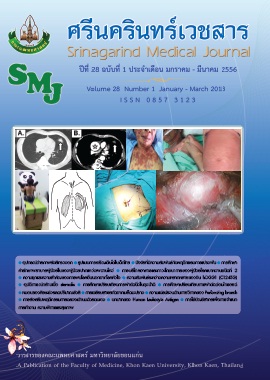Role of Human Leukocyte Antigens on Severe Cutaneous Drug Reactions
Abstract
Cutaneous adverse drug reactions are the most common adverse drug reactions which range from mild forms such as rash or urticaria to severe life-threatening forms such as Stevens-Johnson syndrome (SJS), toxic epidermal necrolysis (TEN), drug rash with eosinophilia and systemic symptoms (DRESS) or hypersensitivity syndrome (HSS). It has been reported that severe cutaneous adverse drug reactions from certain drugs are highly associated with the patient’s human leukocyte antigens (HLA) genotypes. To date, the knowledge obtained from these discoveries can be applied in clinic for screening of patients who may be at risk of severe cutaneous adverse drug reactions caused by certain drugs. This genetic test may help to increase drug safety as well as decrease morbidity and mortality from these severe cutaneous adverse drug reactions. Keywords: Cutaneous adverse drug reactions, Human Leukocyte Antigen (HLA), Stevens-Johnson syndrome (SJS), toxic epidermal necrolysis (TEN), drug rash with eosinophilia systemic symptoms (DRESS) or hypersensitivity syndrome (HSS).




